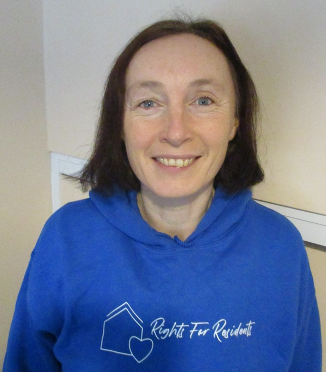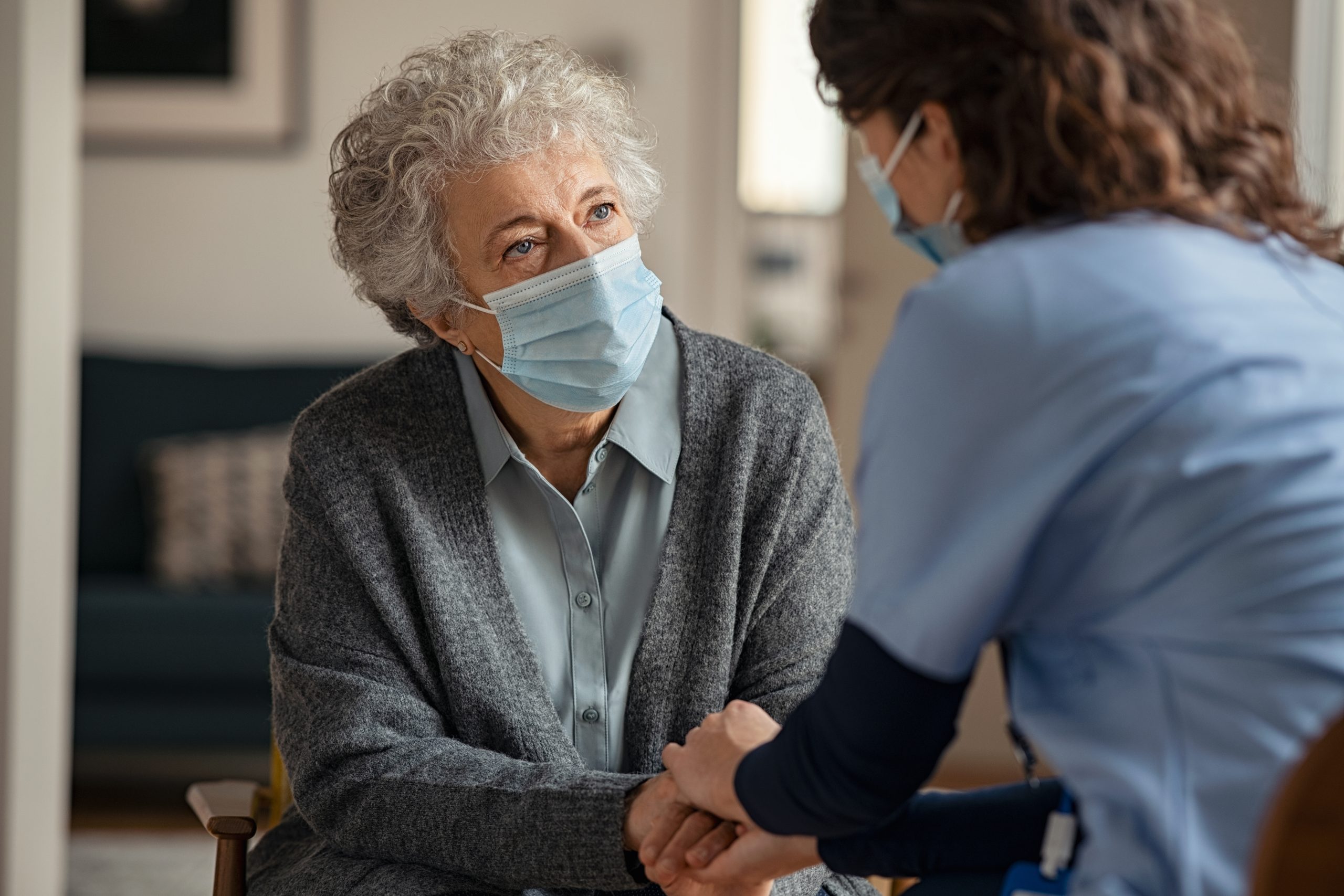Claire Marsh, at the Improvement Academy, has shared her thoughts on the ‘essential caregiver role’ and her personal experience on care home visiting restrictions..

 Whilst there is a government road map for the easing of lockdown across England, no such road map exists to detail when restrictions for access to loved ones in care homes will be lifted. This matters enormously because care home visitors are often more than just visitors. They are often the family or friends with the closest bonds that, before the pandemic, residents with a range of cognitive, emotional and physical needs, relied upon. These sons, daughters, parents, siblings and friends support residents as advocates, providing stimulus, communicating, helping exercise, assisting with basic needs, and making them feel loved and connected to the lives they lived before they needed 24 hour care. Once you experience the essential nature of these relationships first hand, either as a resident or as someone in the supportive role, it is inconceivable that access to them would be removed, and even more inconceivable for this to go on indefinitely. Against a backdrop of over one year of restrictions in which closest loved ones have been largely airbrushed from their caring role, campaign groups (Residents & Relatives Association, John’s Campaign, Rights for Relatives and the National Care Forum) are championing the concept of ‘Partners in care’ to redress the balance and start to properly value informal support once more.
Whilst there is a government road map for the easing of lockdown across England, no such road map exists to detail when restrictions for access to loved ones in care homes will be lifted. This matters enormously because care home visitors are often more than just visitors. They are often the family or friends with the closest bonds that, before the pandemic, residents with a range of cognitive, emotional and physical needs, relied upon. These sons, daughters, parents, siblings and friends support residents as advocates, providing stimulus, communicating, helping exercise, assisting with basic needs, and making them feel loved and connected to the lives they lived before they needed 24 hour care. Once you experience the essential nature of these relationships first hand, either as a resident or as someone in the supportive role, it is inconceivable that access to them would be removed, and even more inconceivable for this to go on indefinitely. Against a backdrop of over one year of restrictions in which closest loved ones have been largely airbrushed from their caring role, campaign groups (Residents & Relatives Association, John’s Campaign, Rights for Relatives and the National Care Forum) are championing the concept of ‘Partners in care’ to redress the balance and start to properly value informal support once more.
They are asking that ALL care providers fully embrace the ‘Essential Caregiver’ role that closest loved ones can provide, as outlined in the latest government guidance for care home visiting on 8 March, 2021. This states:
the Essential Caregiver role is intended for circumstances where the person’s presence or the care they provide is central to the health and wellbeing of a resident.
This is a role that is over and above the recently permitted ‘designated visitor’ who can come for booked slots dependent on availability, stay largely at a distance, and who can be cancelled as and when the care home deems necessary (e.g. a positive Covid-19 staff case). For the Essential Caregiver, an individual risk assessment should be conducted to determine what support the caregiver can bring to the resident and how this can be facilitated safely, following the same infection control measures as apply to staff. As a daughter of a care home resident with dementia (my Mum), I welcome the concept with open arms because I want to contribute to her wellbeing as fully as I did before the pandemic. I saw myself as her primary advocate and her rock. However my experience of a year of being shut out and devalued on the one-hand, combined with the sense that the care home management and staff have been pushed into a corner to make them behave in this way, makes me hesitate to request this Essential Caregiver status. I have been bruised and worn down by a number of requests I have made to provide tailored support to my Mum as needs have arisen, only to have these escalated away from the care home management themselves to senior teams remote from the situation. The answer has always come back as a standard negative response governed by blanket rules from the local authority’s public health team, or more recently that they must ‘await further guidance’ from the senior management of the care home chain. It is likely that when I make this latest request, the care home management themselves will not feel empowered to accommodate me. On top of that, I am so acutely aware of how busy they are that they will struggle to enact the individualised approach to risk management that this demands. This is a sorry situation precisely because there is no clear way out.
I fully expect the support that I offer as I make my request to be underplayed, and I am worried about how I will take another insult of that kind. What I am able to give to Mum is to calm, clarify, reassure, make her feel loved, connected to her wider family, and to help her have fresh air and exercise through short walks. To routinely receive this input is for her to feel, in her own words, ‘normal’. Otherwise she cannot fathom the point of each day amidst a constant confusion. I know what I provide is valuable beyond words but I also suspect that because she is probably not going to die next week through lack of my input, I am not sure it will cut it when the care home defaults the decision-making to higher powers.
However if the unspoken plan for care homes is that we are to wait for the risk of Covid-19 to go before we allow full access to loved ones again, I fear we will be waiting for months or even years. I will therefore make the request for the sake of what is right for my Mum. I know she would benefit from me reinstating the routine I provided before the pandemic. I need to be able to take her to hospital appointments when she needs them (she has missed investigative scans because she could not face them alone). She also needs me to take her to the dentist and opticians. And if, after trips out for these essentials, she has to then isolate in her room for 14 days even after testing negative (outrageous!) then I need to be able to support her through the trauma that will cause. And finally, for the sake of a sense of normality, I need to be able to walk her round the green (just outside her care home) to give her fresh air knowing that staff do not have time to do that.
I will also make my request for Essential Caregiver status in order to help contribute to this ‘Partners in care’ movement that, spearheaded by the tireless campaigners, is now desperately needed as a new narrative for care. Only by engaging in open and frank discussions with all those involved (care providers; local authorities; families) and listening to all their perspectives, will we be able to ask the questions we need to ask to move us towards respectful and effective caring partnerships for the long-term:
- Who has ultimate responsibility for residents’ needs? Currently the pandemic has shown this to be solely resting with care home providers, at least legally, hence them essentially ‘battoning down the hatches’ and in the process, disempowering families in order to protect themselves. Could we avoid this situation in future if individualised contracts were made when someone moves in that identify the responsibilities of those caregivers, additional to the care home staff, so that the burden of risk too can be shared?
- How can we begin to value the aspects of care that are currently viewed as non-essential? Can emotional support and reassurance for example, be given as much kudos as helping to feed?
- How can care home staff be supported adequately so that they can find the time and resources, and develop the skills required for individualised care planning, risk assessments and relationship building with loved ones?
- In recognition that care home staff will never be able to provide everything for residents, what is the role of families and wider communities in contributing to this effort?
- What are the human rights issues (e.g. lack of access to family life or going out) that have been largely disregarded through this pandemic that we want to ensure become firmly accepted, non-negotiable principles in the future?
It has become a familiar notion that the pandemic has highlighted vulnerabilities in society and that we should take this opportunity to learn from these lessons and create positive change for the future with and beyond the risk of Covid-19. I hope that, by encouraging as many people like me to request Essential Caregiver status and providing resources to help us do it, the campaigners behind the ‘Partners in care’ movement are forcing dialogue and learning around these types of questions. I know that, also as a result of campaigners and trailblazing care homes, discussion forums for care providers and other key parties are establishing to support reflection and problem-solving along the way. If as many of us as possible use our experiences to contribute to these then change may be edged further along. I wish everyone like me luck as they make their requests to be allowed to be caregivers again for their loved ones, and I hope care providers are given the support they need to respond to these requests positively and with open minds.
Resources to support those requesting ‘Essential Caregiver’ are available online:
